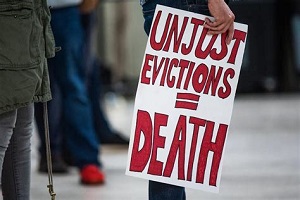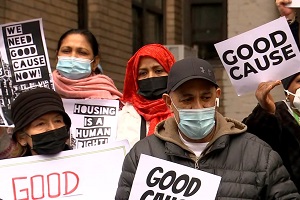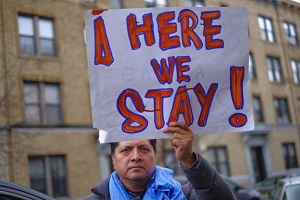
LAW FIRM BLOG
Good Cause Eviction Legislation Proposed for New York State
March 17, 2022
New York has led the nation with many progressive laws but not in tenant protection legislation, particularly when compared to states like California. One piece of legislation working its way through the legislature, however, is the Good Cause Evictions bill. The bill is a direct effort to combat New York’s problematic no-cause rent increases and lease renewal denial. The bill has struggled to pass thus far but remains an important topic at the forefront of New York policy discussions.
Good cause eviction protections would provide tenants with a baseline “right to remain” by prohibiting no-cause evictions and requiring landlords to justify rent increases greater than 3 percent with a “good cause.” So, if a tenant wishes to renew their lease for another year, but the landlord denies the request, Good Cause Eviction would require a justified reason for the denial. A “good cause” is generally defined as substantial violations of a lease, such as failure to pay rent or destruction of property. If a tenant receives an eviction notice without a legal reason, the tenant can challenge the eviction in court under good cause protections.
While the hope is that no family or tenant would ever be evicted without a good cause, it’s not the reality. Too many families are vulnerable to unfair evictions at a landlord’s discretion, and Good Cause Eviction would place restrictions on when a residence can be evicted. Through the court process, a judge will preside over the decision to verify it is justified.
Proponents argue Good Cause has widespread benefits. Foremost, it gives tenants stability, security, and legal protection against arbitrary rent hikes or eviction. Too often tenants prematurely “self-evict” when they fear displacement. They believe it can also embolden tenants to assert their rights. Under good cause, when tenants experience poor living conditions, discrimination, or other illegal landlord behavior, they can safely pursue the issue with their landlord or file a complaint without fear of retaliatory eviction.
Moreover, advocates add, good cause eviction stabilizes communities. The policy curbs speculation by making it more difficult for large investors to flip rental housing and hike the rents. Evidence from four California cities with a similar policy found lower eviction rates and lower eviction filing rates. With less displacement and more emplacement, it is argued, New York can foster healthier communities.
Efforts to pass good cause evictions in New York are ongoing. In 2019, a bill was introduced in the New York State Senate (S2829B) sponsored by Brooklyn Senator Julia Salazar and Assembly (A05030B) sponsored by Syracuse Assemblymember Pamela J. Hunter, and again in both houses 2021 (S3082 and A5573), but the bills were never put to a vote.
New Data on Good Cause Eviction
The Community Service Society offers some new calculations to show just how impactful the policy would be—for tenants, for localities, and for the state as a whole.
According to the 2021 version of the bill, good cause eviction would apply to all rental units except those in small, owner-occupied buildings, or those which already have comparable protections (i.e., public, subsidized, and rent-stabilized apartments). Using the most recent American Community Survey and a variety of other publicly available datasets, the estimated number of households who would benefit from good cause protection in every county in New York are:
About 1.6 million renter households in New York State—nearly half the state’s renters—would be newly covered by good cause eviction protections.
For all counties outside New York City, over 50 percent of renters would be eligible for good cause protections. For half of New York’s counties, at least 2 of every 3 households are eligible.
The relatively lower rates of eligibility in New York City are due to the city’s high percentage of public, subsidized, and stabilized rentals, which already carry comparable or stronger protections. That is, more New York City tenants already have comparable eviction protections than renters elsewhere in New York State.
Critics Argue Proposed Good Cause Legislation Curbs Property Rights
Landlords, realtors, and other real estate professionals have been very vocal in their criticism of the bill. Their primary concern is that landlords will have little control over their own business operations if evictions must receive court approval.
Without the power to make their own decisions, these professionals worry it could result in severe financial hardship with costly court appearances to approve a decision and also the stress of a prolonged unhealthy relationship with a tenant. Additionally, if a case were to go to court, the tenants would have the right to stay in the property while court proceedings went on for additional months, leaving the landlord helpless and with additional economic liability.
Opposers of Good Cause Evictions also argue that the people the bill would hurt most are small to mid-level investors. An out-of-town real estate mogul with millions of dollars in properties located across the country may not be as seriously impacted by Good Cause Eviction’s rules as a local entrepreneur who has one property in their portfolio.

Naysayers worry that it could harm landlords more than it may help renters. Critics ask is a potentially small margin of relief for renters worth helpless situations for landlords? Because of this, some opponents propose that more research be done to validate the anticipated positives of the bill so that they can be weighed against the expected negatives.
In a series of public comments on the bill’s New York State Senate page, the public can openly offer their opinions, many of which strongly caution against the bill. One mortgage company owner said, “This bill would put the brakes on multifamily investment in NY for the foreseeable future.… You will be hurting business owners like myself, realtors renting these apartments, contractors renovating these apartments, building material [manufacturers] and eventually companies looking to bring more businesses and employees to NY. Where will their employees live? This bill has a catchy name but it is downright cruel.”
Critics Argue Proposed Good Cause Legislation Enacts a Statewide Rent Cap and Inhibits Property Renovation
Critics argue that though the legislation has an appealing name, the law itself disregards the reality of rental housing operations and defies the very real need for unit repair and renovation (76 percent of New York apartment buildings were built before 1980). That’s because, under the “good cause” bill, housing providers would be unable to take possession of units solely for the purpose of rehabilitating units.
Further, the bill deems any rent increase of more than 3 percent or 1.5 times than the regional inflation rate, whichever is higher, as “unreasonable.” Housing providers could seek approval from the courts, but the cost of legal counsel is another added expense with no guarantee of a favorable ruling. Instead, buildings would continue to age and housing providers would be unable to properly maintain properties.
The bill essentially equates to a statewide rent cap and would severely harm existing housing and investment into new housing. It would also subject lease termination to court review and interfere with housing providers' ability to non-renew leases for valid business reasons. Importantly, it also applies to all rental housing except owner-occupied 1-4 unit properties.
Opponents such as The National Apartment Association (NAA) and their affiliate partner, the Community Housing Improvement Program (CHIP) of New York City, stress the bills place unnecessary burdens on the industry and will lead to less housing as existing units age out of the market and new construction grinds to a halt – exacerbating the nation’s housing affordability crisis.
Good-Cause Eviction Legislation Gains Momentum in New York
Tenant advocates in New York are calling for passage of a statewide good-cause eviction bill in the upcoming legislative session. The recent passage of similar measures in several upstate jurisdictions adds further momentum to the push for a statewide law.
The statewide legislation would prevent no-fault evictions and establish a tenant’s right to an automatic lease renewal in most cases. Some circumstances would allow the landlord to evict a tenant due to major violations of a lease or failure to pay rent except in the case of a steep rent increase. The bill defines a steep rent increase to mean either a 3% increase or 150% of the Consumer Price Index, whichever is greater, unless major market changes or renovations justify such an increase. The pandemic’s impact on housing instability has reignited the push for the legislation.
The urgency to pass good-cause protections coincides with the expiration of New York State’s eviction moratorium on January 15, 2022. Even after the distribution of $2.2 billion in emergency rental assistance, an estimated 591,000 households in New York remain behind on rent, according to the National Equity Atlas, and nearly three-quarters are households of color. Only 2% of households with rental arrears have received aid from the program.
Many advocates, including NLIHC state partner Tenants & Neighbors, argue that the legislation will offer a more effective and stable solution than the further extension of the eviction moratorium. Unlike an eviction moratorium, good cause eviction legislation would protect renters from the large rent hikes—in some cases as high as 70%—that many New Yorkers are currently facing, as tenants would be able to challenge evictions in court if such exorbitant increases left them unable to pay.
The New York City Council approved a nonbinding resolution on December 15, 2021, that calls upon the New York State Legislature to pass the bill. Additionally, advocates have urged Governor Kathy Hochul to support the bill immediately, but Hochul herself hasn’t taken a position on it. Senator Salazar, however, states that she is “hopeful and encouraged” that the Hochul administration will prioritize housing needs.
Momentum for Salazar and Hunter’s good-cause eviction bill comes after important victories in upstate communities. On March 7, 2022, Beacon became the fifth jurisdiction in the Hudson Valley to enact such legislation, following the recent passage of similar measures in Poughkeepsie, Newburgh, Albany, and Hudson. A landlord can still begin court-ordered eviction proceedings if a tenant:
• Violates a substantial legal obligation of their tenancy;
• Commits a nuisance or interferes with the safety and comfort of other tenants;
• Damages property due to malicious intent or negligence;
• Conducts illegal activity in unit;
• Refuses the landlord access to the property to make necessary repairs;
• Is told their unit is unsafe to inhabit;
• Refuses in bad faith a written lease that a landlord offers in good faith.
The law does not apply to certain unique situations, including when the owner lives on the premises and operates less than four living spaces, and only applies to apartments, not commercial spaces. Although the legislation does not explicitly define an “unconscionable” rent increase, it suggests above 5% in a calendar year as an example. A landlord can also reclaim the housing if they need to use it for their own or a direct family member’s personal use as a principal residence.
A renter has the right to refuse to pay rent if a landlord is attempting to raise it by an “unconscionable” amount – more than 5% in a calendar year. However, landlords have the right to argue in court why such a larger rent increase is necessary. Factors a court can consider, according to the law, include a tenant’s ability to pay, improvements made to the unit, if the tenant precipitated the increase, market changes impacting an owner’s operating costs, and a building’s sale price.

Housing Security Fosters Stronger Communities
Implementing a policy such as Good Cause Eviction contributes to a stabler market, fostering stronger communities and housing security, which positively impacts renters, homeowners, and landlords alike. Some also believe that the bill will help to combat further gentrification in important neighborhoods.
In forcing long-standing residents out of their units to raise rents and welcome a new wave of residents for higher returns, communities disintegrate and begin to lose what made them special in the first place.
As a whole, Good Cause Eviction has the potential to save New York residents from having to relocate in a panic, too often to shelters, motels, and other subpar living conditions. With a bill protecting the eviction process, more communities can be kept whole, fewer children will have to switch schools unnecessarily, and there may be a reduction in turnover and stabler job markets within these communities.
Good Cause Eviction laws not only address economic insecurity, but they also aid the fight for racial justice. A new report from NYU’s Urban Democracy Lab and the Community Service Society of New York has found that minority renters, specifically African-American tenants, have been targeted with eviction rates three times that of their white cohorts. Black renters make up a disproportionate share of the renters in New York and counties with high Black populations see more eviction filings than other counties. Housing injustice, it appears, is inextricably connected to racial injustice.
A Scenario
Consider a hypothetical family of four, two of whom are school-aged children, who moved into a building three months ago, agreeing to a year-long lease. After enrolling their kids in school, finding new employment, setting up utilities, furnishing the unit, and finally feeling like they have a home, a landlord decides to sell the building, effectively breaking all leases. There is nothing any tenant can reasonably do, and so their lease will be ending in three months, six months earlier than their year-long agreement. The family was up-to-date on their rent payments, they were good community members, and never caused a nuisance, but still, they and everyone else in the building were forced into eviction.
As the law is currently in New York, there is little that renters can do to protect themselves. Displacing families and breaking apart communities is a crisis that needs to be addressed urgently, and Good Cause Eviction seems to be the most viable option at this time, with the greatest rally of support behind it. Housing insecurities, including the looming threat of unjust evictions, directly impact New Yorkers’ ability to live healthy, secure lives.
Concluding Thoughts
As New York rent prices increase to their highest levels in decades, the eviction moratorium that allowed hundreds of thousands of struggling tenants to remain in their homes during an ongoing pandemic expired almost two months ago, but the state government has no plans to reinstate it.
During the COVID-19 pandemic, the state eviction moratorium safeguarded struggling tenants from homelessness. New York maintained its eviction moratorium longer than any other state, but the pandemic and financial hardship are not over. Two-thirds of New Yorkers rent rather than own their homes due to the high costs of housing in New York City. Renting leaves tenants in a precarious position, especially with rent prices increasing by over 30% over the last year. In contrast, wages and salaries increased by only 4.6% over the same time frame.
Good Cause Eviction legislation is an essential first step in addressing housing insecurity and unaffordable rent, particularly in a landlord-friendly housing market. The effects of the pandemic and the financially inaccessible housing market have left tenants in crisis. Permanent housing legislation like the Good Cause Eviction bill protects vulnerable tenants, provides financial stability and legal rights to a previously unprotected population, and challenges landlords who continue to drive out tenants with rent hikes and profit from their hardship. It is past time to ensure tenants are protected by law.
Breaking News
On March 7, 2022, the city of Beacon became the latest Hudson Valley municipality to approve Good Cause eviction following several months of contentious public discussion. Landlords in the City will no longer be able to increase a tenant’s rent by more than 5% without court approval or choose to remove them from their apartment without cause.
Mayor Kyriacou, who cast the lone dissenting vote to the law, said he would like to see it further refined to protect only low-income tenants–-as many Beacon residents are paying their rent without hardship–-and protect small landlords.
“I’m really concerned that by offering rights to everyone, we’re going to crowd out low-income tenants,” he said, before noting the division that has grown between renters and property owners. “If we’re picking a way to help renters, and I think we do need to help renters, pitting one part of the community against the other is the wrong way to do this. And this does exactly that.”
Second Ward Councilmember Justice McCray responded, noting statistics showing eviction also leads to a greater likelihood of unemployment, medical issues, and addiction. McCray said the law also would help bring “racial justice to housing.
“This law is designed to keep people in their homes,” McCray said. “I don’t necessarily see how it would push low-income renters out.”
Many landlords and realty groups have opposed similar laws in other areas in which versions passed. Speaking before the vote Monday, Beacon landlords pointed to the rising costs facing landlords, including maintenance (building materials and labor services), heat, and utilities. Some speakers opined existing state laws and regulations should provide enough protection for tenants.
Speaking at a public hearing last month, one landlord of commercial/residential space declared, “By limiting the ability to raise the rents on the apartments, which might be the right thing to do, you’re putting the onus on the small business downstairs that’s going to have to increase their rent 10-12% in that timeframe in order to” appease all parties involved.
Decision Celebrated
The city council issued a press release touting its passing, claiming the law “leads the state in protecting tenants from frivolous evictions.”
Councilmember At-Large Paloma Wake boasted “While this law does not directly address affordable housing per se, we know that stable housing has compounding benefits for the entire city,” Wake said. “When basic needs are met, individuals can be more active and thriving members of our community.”



